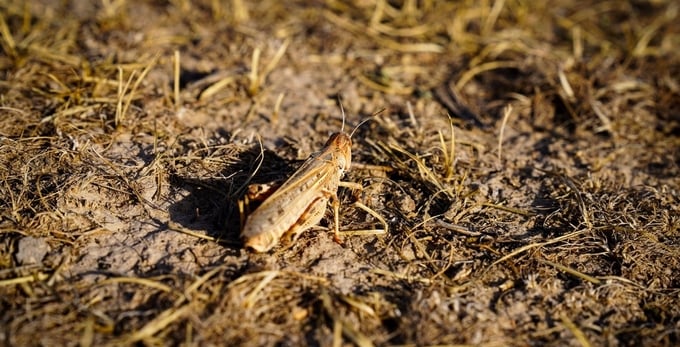May 19, 2025 | 07:21 GMT +7
May 19, 2025 | 07:21 GMT +7
Hotline: 0913.378.918
May 19, 2025 | 07:21 GMT +7
Hotline: 0913.378.918

A Moroccan Locust outbreak this year could result in crop losses ranging from 700 000 to 1.2 million metric tonnes of wheat - up to a quarter of the total annual harvest.
The sightings of locust at different development stages have been made in Badakhshan, Badghis, Baghlan, Balkh, Kunduz, Samangan, Sar-e-Pul and Takhar, with fresh reports coming in from Heart and Ghor provinces.
“The reports of Moroccan Locust outbreak in Afghanistan’s wheat basket is a huge concern. The Moroccan locust eats more than 150 species of plants, including tree crops, pastures and 50 food crops, all of which grow in Afghanistan. It represents an enormous threat to farmers, communities and the entire country,” said Richard Trenchard, the FAO Representative in Afghanistan.
“The last two big outbreaks, 20 and 40 years ago, cost Afghanistan an estimated 8 and 25 percent of its total annual wheat production. Harvest forecasts this year are the best we have seen for the last three years – but this outbreak threatens to destroy all these recent gains and dramatically worsen the food insecurity situation later this year and into next year,” Trenchard added.
The Moroccan Locust is ranked among the most economically damaging plant pests anywhere in the world. A full outbreak this year could result in crop losses ranging from 700 000 to 1.2 million metric tonnes of wheat - up to a quarter of the total annual harvest. This translates to between USD 280 million and USD 480 million in economic loss – as of today's prices in the country.
North and Northeast regions of Afghanistan are prone to Moroccan Locust outbreaks. This year has seen “perfect” conditions for a locust outbreak: drought, over-grazing, very limited locust control and just the right amount of rainfall in March and April for locusts (approximately 100 mm). These conditions created the ideal environment for locusts to hatch and swarm.
In these parts of Afghanistan, Moroccan Locust lay eggs between May and June, depending on environmental conditions, in hilly and rangeland areas. The young locusts hatch from the egg-pods the following year in late March and start feeding on surrounding grasses. This year the hatching started earlier than usual.
“The alarm bells rang late, but FAO, its incredible NGO partners, local communities and local authorities sprang into immediate action,” said Trenchard. “Chemical supplies were low across the country so we were forced to focus on traditional ‘mechanical control’ methods to reduce the impact of the outbreak.”
The FAO Representative said thousands of people in communities across the affected provinces have been working day and night to kill the hopper bands before they become adults and begin to swarm. “We've used our cash-for-work methodology to put money into the pockets of farmers most at risk while accelerating mechanical control in communities across the North and Northeast regions. We have also seen a strong, rapid and encouraging response from the Ministry of Agriculture, Irrigation and Livestock, although their capacity to respond is heavily constrained by a lack of resources,” he added.
An outbreak that has an ominous and existential threat to food security in Afghanistan – and beyond
Typically, in such outbreaks, after decimating pasture, large locust hopper bands and adult swarms move down to cropland areas and eat rain-fed and irrigated wheat and other crops. There is not a single crop which is spared from Moroccan Locust damage.
If the Moroccan locust population is left untreated, it could increase its numbers by 100-fold in the next year, creating even bigger problems for agriculture and food security for Afghanistan and that of its neighbours.
“Chemical control methods are far more effective than mechanical control. Afghanistan used to have a very strong locust control system in place. But this has been heavily eroded in the last two years. At this point in time, all we can hope is that the mechanical control approaches will reduce the overall impact of the swarms. But we must start now to prevent 2024 from seeing even bigger outbreaks; a very real threat going forward,” Trenchard said.
In response to the threat, funding is urgently needed to support both mechanical and chemical control measures alongside on-the ground surveys to monitor and map locust hatching sites, Trenchard said.
(FAO.org)

(VAN) Fourth most important food crop in peril as Latin America and Caribbean suffer from slow-onset climate disaster.

(VAN) Shifting market dynamics and the noise around new legislation has propelled Trouw Nutrition’s research around early life nutrition in poultry. Today, it continues to be a key area of research.

(VAN) India is concerned about its food security and the livelihoods of its farmers if more US food imports are allowed.

(VAN) FAO's Director-General emphasises the need to work together to transform agrifood systems.

(VAN) Europe is facing its worst outbreak of foot-and-mouth since the start of the century.

(VAN) The central authorities, in early April, released a 10-year plan for rural vitalization.

(VAN) Viterra marked a significant milestone in its carbon measurement program in Argentina, called Ígaris, reaching 1 million soybean hectares measured.